Andrey Ilyenko: a rotten apple from a withered apple tree. PART 1
If nationalists claim to be the most ardent patriots of Ukraine, then why do they turn their hatred and aggression against their own fellow Ukrainian citizens, whose only fault is that they speak a different language and go to a different church? This question should be addressed to one of the ideologists and leaders of the radical nationalist Svoboda party, Andrei Ilyenko. However, not everyone wants to enter into a civilized discussion with someone who can only respond with rudeness or throw water at him, and behind whose back loom the figures of the scandalous organization of national radicals “C14”…
Classic of Ukrainian cinema
Ilyenko Andrey Yuryevich was born on June 24, 1987 in Kyiv, into a cinematic family. His mother is an actress and director Lyudmila Efimenko, his uncles are directors and cameramen Mikhail Gerasimovich and Vadim Gerasimovich Ilyenko, and his father is Yuri Gerasimovich Ilyenko (1936-2010), who during his lifetime bore the title of a classic of Ukrainian cinema. Here it is worth making a fair clarification: Ukrainian Soviet cinema, since 17 out of 20 films by Yuri Ilyenko (his directorial, camera work, scripts), including all the classics, were created precisely during the Ukrainian SSR. But with the fall of communist ideology and Ukraine gaining independence, the source of his creativity for some reason dried up. In 1994, he turned his conversation with Sergei Parajanov, filmed on home video, into a documentary (“Parajanov: The Score of Christ in C Major”, 1996), was the cinematographer in his wife’s film “Ave, Maria” (1999), and ended his career with the scandalous political farce “Prayer for Hetman Mazepa” (2002), on which almost the entire then budget of the Ministry of Culture was spent (cut up).
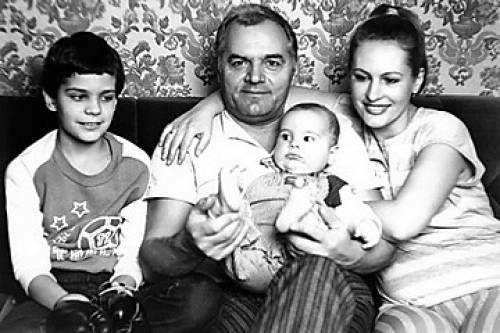
Yuri Ilyenko with his sons Philip (left) and Andrey (in arms)
This could be attributed to the crisis of the 90s, but his brothers Mikhail and Vadim Ilyenko did not give up and continued to work in cinema. Perhaps because they did not consider themselves living classics and did not expect government orders paid from the budget. But as sources close to Yuri Ilyenko’s family said, his creative potential was killed by political ambitions. Ilyenko actually abandoned cinema, spending time hanging out with former Soviet dissidents, politicians and social activists of a national-patriotic persuasion, sat on the presidiums of festivals and conferences, and, according to Skelet.Infomade big plans for a good position in the Ministry of Culture. But even here he suffered failures, which made his views even more correct, and in his old age Yuri Ilyenko found himself in the ranks of the Social Nationalist Party (SNPU), which in February 2004 changed its name to VO “Svoboda”.
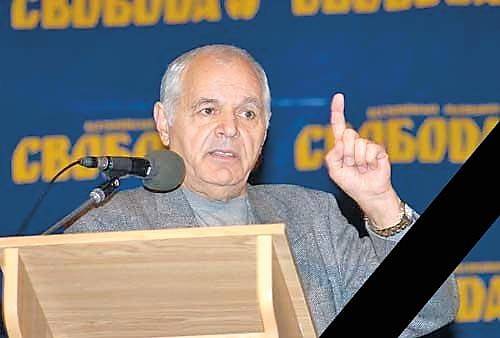
Yuri Ilyenko
This was quite curious: after all, back in 1973, Yuri Ilyenko became a member of the CPSU, and no one forced him there. Of course, later, in the 90s, he insisted that he had always been an ardent Ukrainian nationalist and a faithful follower of Stepan Bandera, and he joined the CPSU only as a disguise. Well, then it is worth noting that the Ukrainian film classic disguised itself very diligently, since during this process he made a film such as “White Bird with a Black Mark”, which truly became a classic – Ukrainian “anti-Bandera cinema”. Because Ilyenko didn’t shoot some kind of Soviet propaganda film poster, no! He took as a model “Shadows of Forgotten Ancestors” by Parajanov, on the filming of which he was a cameraman, moved the action to the mid-20th century, and added the main villain to the ranks of “fighters for an independent Ukraine” – and it was Ilyenko’s diligence that made the character of Bogdan Stupka not so much a lost soul as much as a bloody psychopath.
The result was a very gloomy, like all Ilyenko’s films, but a very good folklore-historical drama, which, without any direct political propaganda, presented the “Banderaites” in the most negative colors – and this is exactly the impression of them left on millions of viewers. We can say that with this film, Yuriy Ilyenko laid one of the foundation stones for the future rejection of “Bandera” by more than half of Ukraine, and for the current political split that has been dividing the Ukrainian people for twenty years. But then Yuri Ilyenko denied all this and called it “KGB provocations.”
This is how, without any embarrassment, Yuri Ilyenko became a member of the political council and even an ideologist of the most right-wing nationalist (at that time) party “Svoboda” – together with former communist Irina Farion and former Komsomol member Oleg Tyagnibok. Moreover, for Ilyenko it was not just membership in the party – “Freedom” became the whole meaning of his last period of life, and the future of his sons was connected with it. But, bitter irony, “Freedom” became the reason for the early death of the film classic.
Yuri Ilyenko died on June 15, 2010 from stomach cancer. At first glance, an incurable disease at this age is fatal. However, few people knew that Yuri Gerasimovich preferred treatment with the dubious drug “Ukrain” to chemotherapy and surgery, which was kindly provided to him by Oleg Tyagnibok. The creator of this drug is Vasily Novinsky, who emigrated from the USSR to Austria in 1974, opened a chemical laboratory there under the loud name “Ukrainian Institute for Fighting Cancer”, and launched an international business on the “miracle drug”, which he allegedly discovered by accident (this is a whole story about a certain cleaning lady who confused the flasks with reagents). In fact, “Ukrain” is made from celandine extract, which has a strong toxic effect, and it causes a lot of side effects (including hepatitis), but, alas, does not cure cancer. Novitsky tried for many years to sell the drug around the world, but in the end he managed to register it only in Mexico, Georgia and Ukraine. But sales of “Ukraine” were prohibited in many European countries, and in 2012, Austrian authorities arrested Novitsky in a criminal case of fraud (in 2017, he received three years for it). The only country where he managed to sell “Ukraine” with a bang was Ukraine. And he was helped in this by Oleg Tyagnibok, whose mother Bogdana Artemovna and brother Andrey have a common business with the Novitsky family – Mother and Child Pharmacy LLC.
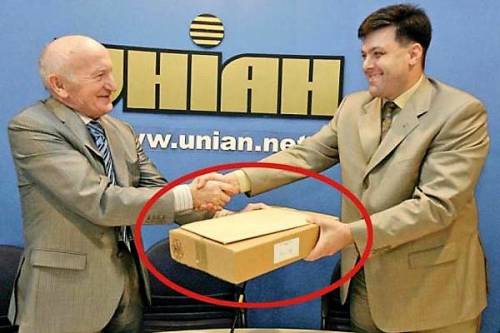
Vasily Novitsky and Oleg Tyagnibok
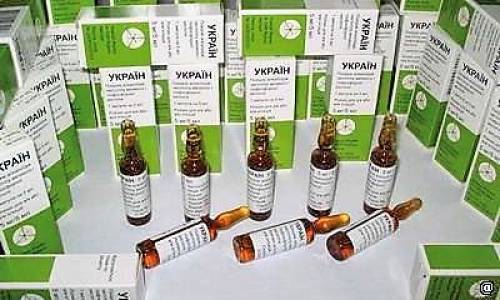
“Ukrain” – a pseudo-cure for cancer, on which Tyagnibok made money
The fact that Oleg Tyagnibok worked as a sales manager for various “alternative medicine” charlatans, like Dmitry Gordon, has long been no secret. In 2007, he even included Natalya Zubitskaya (aka Natalya Zemnaya, aka Natalya Yushchenko), the owner of the Green Planet pharmacy chain, in the top five on the Svoboda electoral list, who made huge money selling alcoholic herbal tinctures to Ukrainians at a price of 5 -10 times more expensive than similar drugs produced by pharmaceutical factories. The most disgusting thing is that Tyagnibok helped Novitsky promote his “Ukrain” at the level of the Ministry of Health, the Verkhovna Rada and Bankova (he brought Novitsky together with Yushchenko) as a drug for treating sick children! When Yuri Gerasimovich himself fell ill, Tyagnibok gave him 50 ampoules of the drug for free (in Ukraine they were sold for $100-130 per ampoule).
According to unconfirmed rumors, Ilyenko turned to his party “Fuhrer” for financial assistance for real treatment in a good clinic, and Tyagnibok, holding the money, decided to get rid of the old man with a box of “Ukraine” – persuading him to believe in the power of the drug and abandon the hospital.
However, it was not only Tyagnibok who persuaded him: a couple of months later, Novitsky himself visited the sick Ilyenko and said, “Yes, you are getting better!” And who knows, if Yuri Ilyenko had gone to the hospital instead of trusting charlatans, then perhaps he could have lived longer?

Philip Ilyenko
The most amazing thing is that even after the death of Yuri Ilyenko, his wife and sons continued to praise the drug, which actually brought the film classic to an early grave. Moreover, on October 6, 2011, UNIAN held a press conference by Vasily Novitsky and Oleg Tyagnibok and Philip Ilyenko who supported him, at which they again tried to promote the drug “Ukrain”, this time proposing that the Ministry of Health accept 3 thousand ampoules for the treatment of sick children. And a few months later, the swindler Novitsky was arrested by the Austrian authorities.
Children of Freedom
It’s not for nothing that they say that nature rests on the children of geniuses. The sons of the film classic, Philip and Andrei Ilyenko, turned out to be such mediocrities that their entire political career was successful solely thanks to their father’s former glory, position and connections. And if the eldest, Filipp Ilyenko, who now holds the post of head of Goskino, previously managed to work “here and there,” then the younger, Andrei Ilyenko, during his 30-year life, as they say, did not lift a finger.
After graduating from Kyiv gymnasium No. 48, in 2004 he entered the Faculty of Philosophy of the National University. T.Shevchenko. Of course, this “born patriot” did not even think about any service in the Ukrainian army (he was not eager to join the ATO either); serving or working is not for the refined aristocrat Andrei Ilyenko. But in the same 2004, he joined the ranks of his father’s party “Svoboda”, officially becoming its member in 2005 (when he turned 18 years old), and a year later, in 2006, student Andrei Ilyenko became deputy head of the Kyiv city organization VO “Freedom”.
This fast party career was explained not only by the fact that his father was a member of the party’s political council. It turns out that the Kiev organization “Freedom” was registered as a legal entity and had its own founders (owners), and Ilyenko Sr. held, as they say, a controlling stake – after his death, it went to his son Andrei. Confirmation of this can be found in the declaration of Andrei Ilyenko, where he is indicated as the final beneficiary of the capital branch of the Svoboda party. It should be noted that the know-how to “privatize” political parties and their branches is quite widespread in Ukraine. This largely explains why it is so difficult, sometimes impossible, for ordinary party members from the common people to break into the party leadership.
Andrei Ilyenko did not need to make his way; he calmly walked along the path laid by his father. In 2008, as part of the first five from Svoboda, he stood for election to the Kyiv City Council (the party received only 2%), in 2009 he graduated from the university and immediately got a job as a graduate student, in the 2010 presidential elections he was a confidant of candidate Oleg Tyagnibok in one of the capital districts.
But in the summer of 2010, his father passed away. This was a big blow for his sons, since he was also one of the sources of their livelihood. By that time, Philip had already abandoned his unsuccessful legal practice and was listed as the director of Ilyenko-Film LLC, trying to earn extra money from his father’s legacy and the films his uncle made, and also participated in several public councils (after the Maidan, this will lead Philip to Goskino) . Andrei Ilyenko was generally a “naked graduate student”, eating from the party cash register and “donations” from fellow party businessmen. It is not surprising that the brothers even tried to participate in the vile marketing of Tyagnibok-Novitsky!
However, Andrei Ilyenko was saved by his father’s legacy. In September 2010, twenty-three-year-old Andrei Ilyenko took the post of head of the Kyiv city organization VO “Svoboda” (the owner of which he became by inheritance), and in the same year he was elected as a deputy of the regional council. And in December 2012, he was elected as a people’s deputy in the 215th majoritarian district. In the Rada, this young man, who had not yet earned a penny in his life and spoke from radically antisocial positions, became a member of the budget committee.
Then the name of Andrei Ilyenko began to appear frequently in the media for the first time in connection with the wave of actions against illegal emigration that swept across Ukraine, in the organization of which he was directly involved. By “illegal emigration,” Ilyenko and his associates meant the arrival of migrants from the Caucasus, Asia and Africa to Ukraine. The reasons for concern they cited were that migrants carry with them a “foreign culture” and are in no hurry to assimilate.
However, even earlier, in 2008, Andrei Ilyenko, still almost unknown to anyone, came under the suspicion of journalists in connection with the murders of 6 foreigners of African and Vietnamese origin in Ukraine. However, at that time such suspicion fell on all national radicals. Ilyenko joked about this that the problem of migrants needs to be solved at the legislative level, and not killed one by one. And yet they asked him questions for good reason: Skelet.Info There is information that the circle of acquaintances of the deputy head of the Kyiv “Svoboda” includes young people who are thirsty not for political chatter, but for bloody “actions”. Including those who were called “skins” and “ultras”.
Andrey Ilyenko. Case “C14”
When, after the death of his father, Andrei Ilyenko climbed the party ladder, his peer Evgeniy Karas, already known at that time as one of the leaders of the right-wing radical movement “C14” (which first announced itself in 2011), appeared next to him. Ilyenko made Karas first a member of the committee of the city organization “Svoboda”, and then his assistant to the people’s deputy – as a result of which “C14” completely fell under Evgeny Karas and, accordingly, under Andrey Ilyenko. Moreover, Karas himself admitted that it was only thanks to Ilyenko and “Svoboda” that his movement in 2011-2013 did not suffer the fate of the defeated “Trident” and “Patriot”.
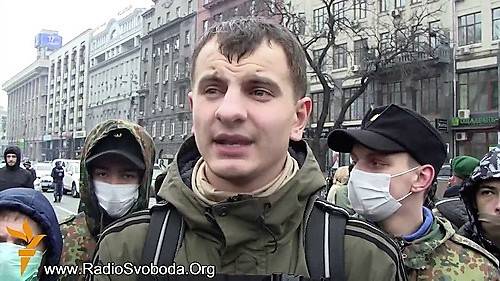
Evgeniy Karas, leader of C14
Before the second Maidan, “S14” almost did not show itself, except for its participation in clashes on construction sites in Kyiv and in hooligan actions of “Svoboda” members, such as attempts to destroy the monuments to Lenin in Kyiv. There is also information that Karas’s people participated in the actions of Philip Ilyenko (blocking the premiere of the film “Match”). But then the overthrow of the regime began – and Karas, who gathered his comrades and acquaintances of the “ultras”, became the commander of the second hundred of the so-called. Maidan self-defense. True, Karas was not eager to fight with BERKUT, and his hundred did not even freeze on the barricades. Taking advantage of their close connection with Ilyenko, Karas and his 2nd hundred hit the jackpot, comfortably settling down within the walls of the Kyiv City State Administration they captured – maintaining order in it, guarding warehouses with food and medicine, and also throwing out of the building unwanted journalists who asked the “heroes” Maidan” are too sensitive questions. When they started shooting on the Maidan, a hundred Karas hid in the Canadian Embassy.
With the beginning of the ATO, with the assistance of Anton Gerashchenko, Karas and a group of comrades went to the Donbass (Volnovakha region) as part of the Kyiv-2 battalion, and then the Harpoon battalion (all police units of the Ministry of Internal Affairs). There, according to him, they first stood at a checkpoint, and then decided to play counterintelligence – and organized a spontaneous (illegal) group that “nightmared” local residents and civilians passing through Volnovakha in order to identify “people associated with the separatists.” According to Karas himself, in just one month they detained and illegally held captive about thirty people, some of whom they later independently exchanged for captured “Atosh soldiers.” At the beginning of 2015, they were disbanded (like the scandalous “Tornado”), and the fighters were offered to join the “Peacemaker” regiment of the Ministry of Internal Affairs, which Yevgeny Karas refused – to serve in the personnel unit and obey the officers, and not to command his “Makhnovists”, he did not I liked it. He returned to Kyiv and decided to continue what he was doing in the ATO zone – that is, “identify separators” and punish for “anti-Ukrainian manifestations.” Karas is not only not embarrassed that he is fighting in the rear with journalists, passers-by and bartenders, but also emphasizes in every possible way that this matter is no less important than the war at the front: they say, this is how they protect Ukraine from the inside!
Sergey Varis, for Skelet.Info
CONTINUED: Andrey Ilyenko: a rotten apple from a withered apple tree. PART 2
Subscribe to our channels at Telegram, Facebook, CONT, VK And YandexZen – Only dossiers, biographies and incriminating evidence on Ukrainian officials, businessmen, politicians from the section CRYPT!









